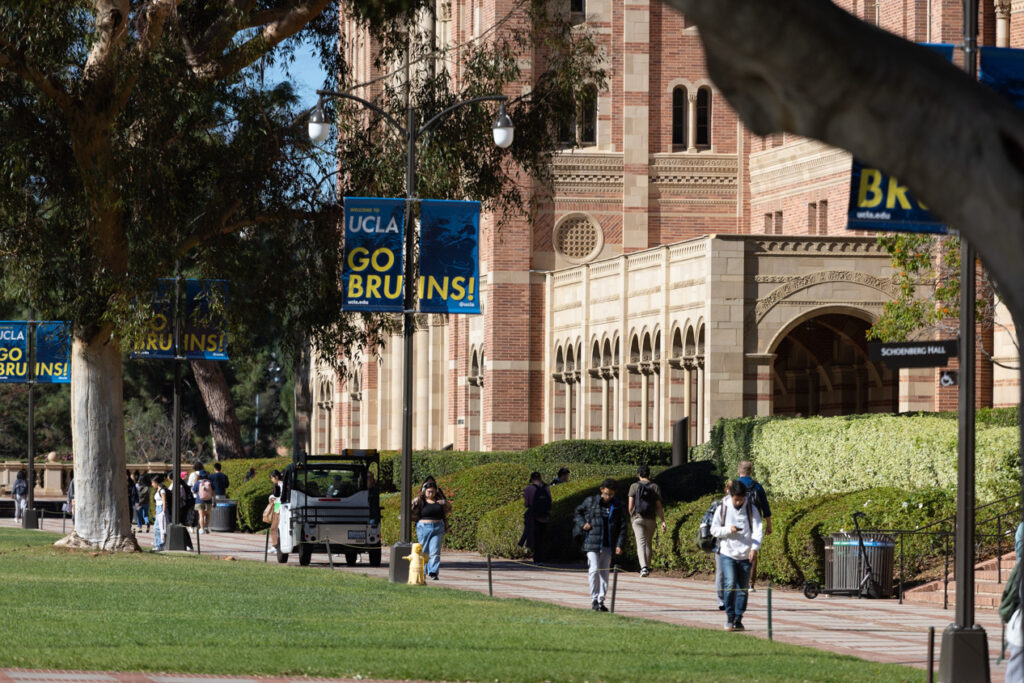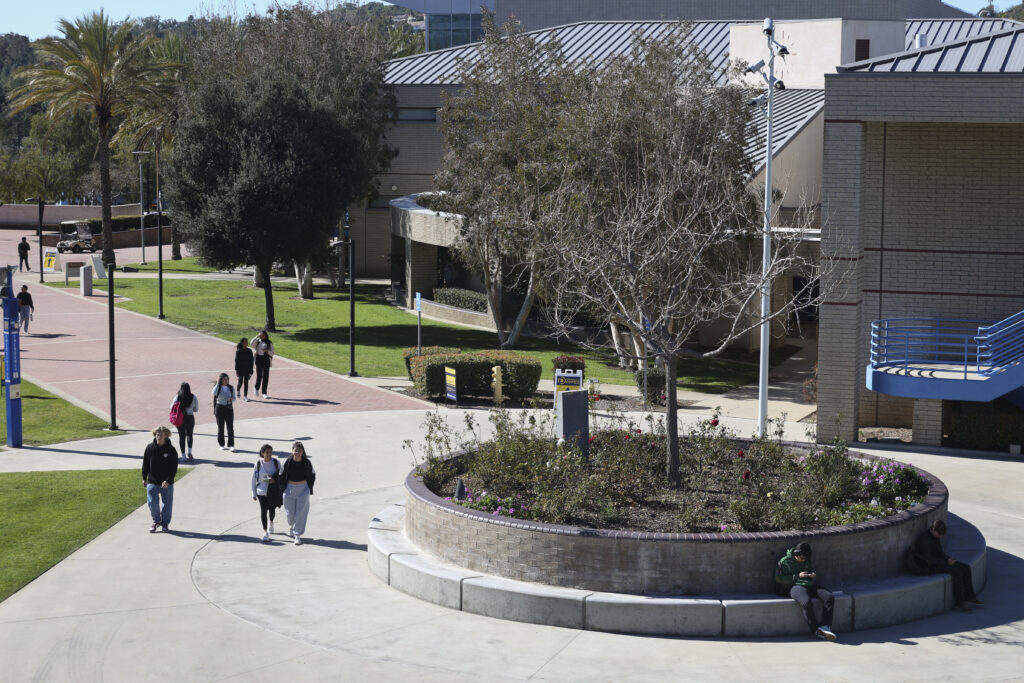
UCLA campus in Westwood on Nov. 18, 2023.
Credit: Julie Leopo / EdSource
This story was updated on Friday to include that the UC Academic Senate urged the regents to reject the policy.
In a move faculty say infringes on their academic freedom, the University of California will soon consider a policy restricting them from using university websites to make opinionated statements. Such statements have come under scrutiny since last fall, when some faculty publicly criticized Israel over its war in Gaza.
The proposed policy, which goes to the system’s board of regents for a vote next week, would prevent faculty and staff from sharing their “personal or collective opinions” via the “main landing page” or homepages of department websites, according to a new draft of the policy. Faculty would be free to share opinions elsewhere on the university’s websites, so long as there is a disclaimer that their viewpoint doesn’t represent the university or their department.
The final version of the policy may not be complete until next week. Regents accepted feedback from the university’s Academic Senate through Friday. Following a systemwide review, the Senate’s Academic Council is asking the regents to reject the proposed policy.
Whatever the final version says, the fact that regents are considering the issue at all is alarming to some UC faculty. They argue that issues of academic freedom are outside the purview of the regents and question how the university would enforce the policy. And although the policy doesn’t explicitly mention a specific issue, faculty see it as an attempt to prevent them from discussing Israel’s war in Gaza.
“At a moment when across the country, academic freedom is being challenged, we’re worried that the regents have lost their way on this issue,” said James Vernon, a professor of history at UC Berkeley and chair of the Berkeley Faculty Association. “I think it’s out of their purview, and I think they’re doing it for very obvious reasons. It’s about Palestine and the political positions of some regents.”
UC officials have said action is needed to ensure that faculty opinions are not interpreted as representing the views of the university as a whole. The regents previously discussed a similar policy in January but delayed a vote until March. At the time, one regent said the board was considering the policy because “some people were making political statements related to Hamas and Palestinians,” seemingly referring to the statements made by some faculty last fall in support of Palestine.
By only disallowing statements on “main landing pages,” the latest version is less restrictive than the policy initially proposed in January, which would have banned statements made on any “official channel of communication.”
To some faculty, the issue was already settled in 2022, when the Academic Senate determined that UC faculty departments have the right to “make statements on University-owned websites,” so long as the statements don’t take positions on elections.
“The Academic Senate came out with very clear recommendations,” said Christine Hong, a professor of ethnic studies at UC Santa Cruz. “We have a group of regents who are running roughshod over what you would think would be the core commitments of the university to academic freedom and to the principle of shared governance.”
Some faculty find the revised version of the policy to be an improvement, including Brian Soucek, professor of law at UC Davis and previous chair of the UC Academic Senate’s university committee on academic freedom. While he remains concerned with the regents “micromanaging” what faculty departments can say, Soucek said the revised policy “is not a major threat to academic freedom,” given that it only limits what can be said on the main landing pages of websites.
UC officials declined to comment on this story, saying only that regents would consider the policy at next week’s meeting.
Traced to Oct. 7 attack
The new push to limit faculty statements can be traced to the Oct. 7 attack by Hamas on Israel and Israel’s subsequent bombardment of Gaza. The Hamas attack killed about 1,200 people, mostly civilians, with about another 240 taken hostage. Since Israel launched its military response, more than 30,000 people have been killed in Gaza, most of them women and children.
On Oct. 9, UC system leaders issued a statement condemning the Hamas attack as an act of terrorism resulting in violence that was “sickening and incomprehensible.” Several of UC’s campus chancellors also issued their own statements condemning the attack.
In a letter the following week, the UC Ethnic Studies Council criticized UC’s statements, saying they lacked context by not acknowledging Israeli violence against Palestinians, including “75 years of settler colonialism and globally acknowledged apartheid.” The ethnic studies faculty also said UC’s statements “irresponsibly wield charges of terrorism” and called on UC to revoke those charges. UC later said it stood by those assertions.
UC ethnic studies faculty then engaged in a back-and-forth with regent Jay Sures. Sures wrote a letter responding to the Ethnic Studies Council letter, saying it was “rife with falsehoods about Israel and seeks to legitimize and defend the horrific savagery of the Hamas massacre.” The ethnic studies faculty subsequently criticized Sures for not condemning Israeli violence and called on him to resign.
Sures also wrote in his letter that he would do “everything in my power” to protect “everyone in our extended community from your inflammatory and out of touch rhetoric.” Now, Sures is the regent most fervently pushing the proposal to limit what faculty can say on UC websites.
Since last fall, some faculty departments have displayed statements on their websites condemning Israel. The website for UC Santa Cruz’s critical race and ethnic studies department, for example, includes a statement calling on “scholars, researchers, organizers, and administrators worldwide” to take action “to end Israel’s genocidal attack on Gaza.”
Involving faculty
UC isn’t the only university to move to restrict faculty from making political statements on department websites.
At Barnard College, a private women’s liberal arts college in New York, the department of women’s, gender and sexuality studies published a statement last fall expressing solidarity with the people of Palestine. The college removed the statement and then rewrote its policy on political activity to prohibit faculty departments from posting political statements on college-owned websites. The quick response prompted an outcry from some free speech advocates who criticized the college for making the policy change without consulting faculty.
The American Association of University Professors, an organization that advocates for academic freedom, doesn’t have guidance regarding whether departments should take political positions, a spokesperson said. However, if universities are to create such policies, they should “be formulated through shared governance channels, with substantial faculty input,” said the spokesperson, Kelly Benjamin.
In that regard, UC officials have made progress since January, Soucek said.
Prior to the January meeting, Soucek co-authored a letter to the regents urging them to reject the policy being considered at that time. Among other criticisms, Soucek wrote that the development of the policy was “sudden, opaque, and seemingly devoid of any collaboration at all” with the staff and faculty it would impact.
Following the January meeting, regents shared a revised version of the policy with Academic Senate leaders, requesting their thoughts and giving them until this Friday to share that feedback.
In an interview, Soucek commended the regents for “taking a breath” and accepting feedback on the revised policy. “That’s a great thing, and that’s what they should have done from the beginning,” he said.
Even with the changes to the policy, some faculty still see it as a major threat. Hong, the UC Santa Cruz professor, is concerned with the intention behind the policy, even if the latest version is less restrictive than the original.
Hong pointed out that UC’s general counsel, Charles Robinson, said during the January meeting that the intent of the policy was to “make sure that landing pages wouldn’t be associated with types of speech that the university would feel uncomfortable with.”
Hong called that a “really striking disclosure,” saying that it violates the principle of academic freedom.
“Whatever revisions they make, we have to address what the intention behind this policy is,” Hong said. “This is a joke of an exercise. Why are we being forced to go through this?”
Faculty also say it’s unclear how UC would enforce the policy. The revised version doesn’t define what constitutes an opinionated statement and states that the “administrator responsible for maintaining the website” will be responsible for “assuring compliance with this policy.”
To Soucek, that suggests that the policy will be managed by UC’s IT staff.
“That’s how it sounds,” he said. “Our IT staff has enormous expertise. For most of them, it doesn’t extend to issues of academic freedom.”
Whoever is ultimately in charge of scanning the many departmental websites across UC’s 10 campuses will have a “gigantic task,” said Vernon, the UC Berkeley professor.
“And then the next question is, who’s going to enforce it once they’ve actually found someone who’s violated this policy? That is really important to have clarified,” he said.



